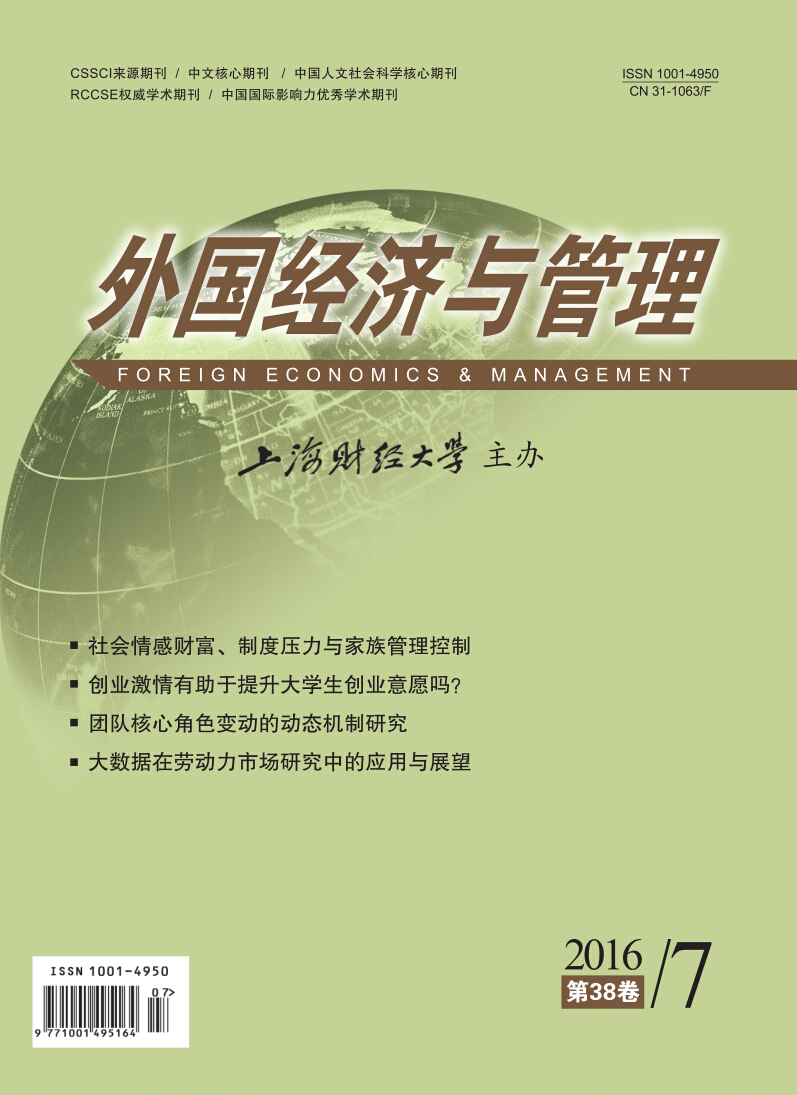社会情感财富的观点认为,管理控制既是社会情感财富的目标,也是保存社会情感财富的手段,而新制度理论的观点则强调外部的制度压力会约束家族对公司管理的控制。家族控制的上市公司如何应对内部要求与外部压力的冲突?本文选取香港资本市场上的国美、创维、雅居乐和新鸿基四个家族上市公司作为研究对象,观察控制家族对六个家族管理负面事件的反应,发现事件确实会导致控制家族承受的制度压力增加,而家族根据制度压力的强弱,通过内部切割、象征性管理和实质性退让等方式加以应对,同时却保持或加强了对公司的股权控制。由此本文得出结论:为了回应外部的制度压力,维护家族对公司的根本性控制,家族往往借助调整管理控制来缓解保存社会情感财富与外部制度压力之间的冲突。上述发现既解决了两种理论观点在家族控制问题上的冲突,揭示了家族控制两个层面的不同作用,也拓展了新制度主义理论对制度压力变化的理论分析。
社会情感财富、制度压力与家族管理控制——基于香港上市家族公司的多案例研究
摘要
参考文献
1 陈凌, 陈华丽. 家族涉入、社会情感财富与企业慈善捐赠行为——基于全国私营企业调查的实证研究[J]. 管理世界, 2014, (8):90-101.
2 贺小刚, 连燕玲, 李婧, 等. 家族控制中的亲缘效应分析与检验[J]. 中国工业经济, 2010, (1):135-146.
3 (美)罗伯特 · K. 殷. 案例研究:设计与方法[M]. 周海涛, 等译. 重庆:重庆大学出版社, 2004.
4 (英)玛丽 · 道格拉斯. 制度如何思考[M]. 张晨曲译. 北京:经济管理出版社, 2013.
5 苏启林, 朱文. 上市公司家族控制与企业价值[J]. 经济研究, 2003, (8):36-45.
6 魏明海, 黄琼宇, 程敏英. 家族企业关联大股东的治理角色——基于关联交易的视角[J]. 管理世界, 2013, (3):133-147, 171.
7 张远飞, 贺小刚, 连燕玲. 危机冲击、损失规避与家族大股东支持效应[J]. 财经研究, 2013, (7):122-133.
8 朱沆, Kushins E, 周影辉. 社会情感财富抑制了中国家族企业的创新投入吗?[J]. 管理世界, 2016, (3):99-114.
9 Bargh J A, Chen M, Burrows L. Automaticity of social behavior:Direct effects of trait construct and stereotype activation on action[J]. Journal of Personality and Social Psychology, 1996, 71(2):230-244.
10 Benninga S, Helmantel M, Sarig O. The timing of initial public offerings[J]. Journal of Financial Economics, 2005, 75(1):115-132.
11 Berrone P, Cruz C, Gomez-Mejia L R. Socioemotional wealth in family firms:Theoretical dimensions, assessment approaches, and agenda for future research[J]. Family Business Review, 2012, 25(3):258-279.
12 Berrone P, Cruz C, Gomez-Mejia L R, et al. Socioemotional wealth and corporate responses to institutional pressures:Do family-controlled firms pollute less[J]. Administrative Science Quarterly, 2010, 55(1):82-113.
13 Bertrand M, Schoar A. The role of family in family firms[J]. Journal of Economic Perspectives, 2006, 20(2):73-96.
14 Carney M. Corporate governance and competitive advantage in family-controlled firms[J]. Entrepreneurship Theory and Practice, 2005, 29(3):249-265.
15 Claessens S, Djankov S, Fan J P H, et al. Disentangling the incentive and entrenchment effects of large shareholdings[J]. Journal of Finance, 2002, 57(6):2741-2771.
16 Claessens S, Fan J P H. Corporate governance in Asia:A survey[J]. International Review of Finance, 2002, 3(2):71-103.
17 Cruz C C, Gómez-Mejia L R, Becerra M. Perceptions of benevolence and the design of agency contracts:CEO-TMT relationships in family firms[J]. Academy of Management Journal, 2010, 53(1):69-89.
18 Eisenhardt K M, Graebner M E. Theory building from case studies:Opportunities and challenges[J]. Academy of Management Journal, 2007, 50(1):25-32.
19 Faccio M, Lang L H P, Young L. Dividends and expropriation[J]. American Economic Review, 2001, 91(1):54-78.
20 Fiss P C, Zajac E J. The symbolic management of strategic change:Sense giving via framing and decoupling[J]. Academy of Management Journal, 2006, 49(6):1173-1193.
21 Gómez-Mejía L R, Cruz C, Berrone P, et al. The bind that ties:Socioemotional wealth preservation in family firms[J]. The Academy of Management Annals, 2011, 5(1):653-707.
22 Gómez-Mejía L R, Haynes K T, Núñez-Nickel M K, et al. Socioemotional wealth and business risks in family-controlled firms:Evidence from Spanish olive oil mills[J]. Administrative Science Quarterly, 2007, 52(1):106-137.
23 Gómez-Mejía L R, Nuñez-Nickel M, Gutierrez I. The role of family ties in agency contracts[J]. Academy of Management Journal, 2001, 44(1):81-95.
24 Johnson S, La Porta R, Lopez-de-Silanes F, et al. Tunnelling[J]. American Economic Review, 2000, 90(2):22-27.
25 La Porta R, Lopez-de-Silanes F, Shleifer A, et al. Legal determinants of external finance[J]. The Journal of Finance, 1997, 52(3):1131-1150.
26 La Porta R, Lopez-de-Silanes F, Shleifer A, et al. Law and finance[J]. Journal of Political Economy, 1998, 106(6):1113-1155.
27 La Porta R, Lopez-de-Silanes F, Shleifer A. Corporate ownership around the world[J]. The Journal of Finance, 1999, 54(2):471-517.
28 Leitterstorf M P, Rau S B. Socioemotional wealth and IPO underpricing of family firms[J]. Strategic Management Journal, 2014, 35(5):751-760.
29 Meyer J W, Rowan B. Institutionalized organizations:Formal structure as myth and ceremony[J]. American Journal of Sociology, 1977, 83(2):340-363.
30 Miller D, Le Breton-Miller I, Lester R H. Family firm governance, strategic conformity, and performance:Institutional vs. strategic perspectives[J]. Organization Science, 2013, 24(1):189-209.
31 Morck R, Yeung B. Agency problems in large family business groups[J]. Entrepreneurship Theory and Practice, 2003, 27(4):367-382.
32 Pierce J L, Kostova T, Dirks K T. Toward a theory of psychological ownership in organizations[J]. Academy of Management Review, 2001, 26(2):298-310.
33 Schulze W S, Lubatkin M H, Dino R N. Toward a theory of agency and altruism in family firms[J]. Journal of Business Venturing, 2003, 18(4):473-490.
34 Schulze W S, Lubatkin M H, Dino R N, et al. Agency relationships in family firms:Theory and evidence[J]. Organization Science, 2001, 12(2):99-116.
35 Scott W R. Institutions and organizations[M]. 2nd ed. Thousand Oaks, CA:Sage, 2001.
36 Siggelkow N. Persuasion with case studies[J]. Academy of Management Journal, 2007, 50(1):20-24.
37 Stewart A. Help one another, use one another:Toward an anthropology of family business[J]. Entrepreneurship Theory and Practice, 2003, 27(4):383-396.
38 Suchman M C. Managing legitimacy:Strategic and institutional approaches[J]. Academy of Management Review, 1995, 20(3):571-610.
39 Westphal J D, Zajac E J. Substance and symbolism in CEOs' long-term incentive plans[J]. Administrative Science Quarterly, 1994, 39(3):367-390.
40 Westphal J D, Zajac E J. The symbolic management of stockholders:Corporate governance reforms and shareholder reactions[J]. Administrative Science Quarterly, 1998, 43(1):127-153.
41 Westphal J D, Zajac E J. A behavioral theory of corporate governance:Explicating the mechanisms of socially situated and socially constituted agency[J]. The Academy of Management Annals, 2013, 7(1):607-661.
42 Wyer R S Jr, Srull T K. Memory and cognition in its social context[M]. Hillsdale, NJ:Erlbaum, 1989.
43 Yu X, Zheng Y. IPO underpricing to retain family control under concentrated ownership:Evidence from Hong Kong[J]. Journal of Business Finance & Accounting, 2012, 39(5-6):700-729.
44 Zott C, Huy Q N. How entrepreneurs use symbolic management to acquire resources[J]. Administrative Science Quarterly, 2007, 52(1):70-105.
引用本文
刘舒颖, 孙嘉宝, 朱沆. 社会情感财富、制度压力与家族管理控制——基于香港上市家族公司的多案例研究[J]. 外国经济与管理, 2016, 38(7): 3–23.
导出参考文献,格式为:





 7659
7659  13067
13067

